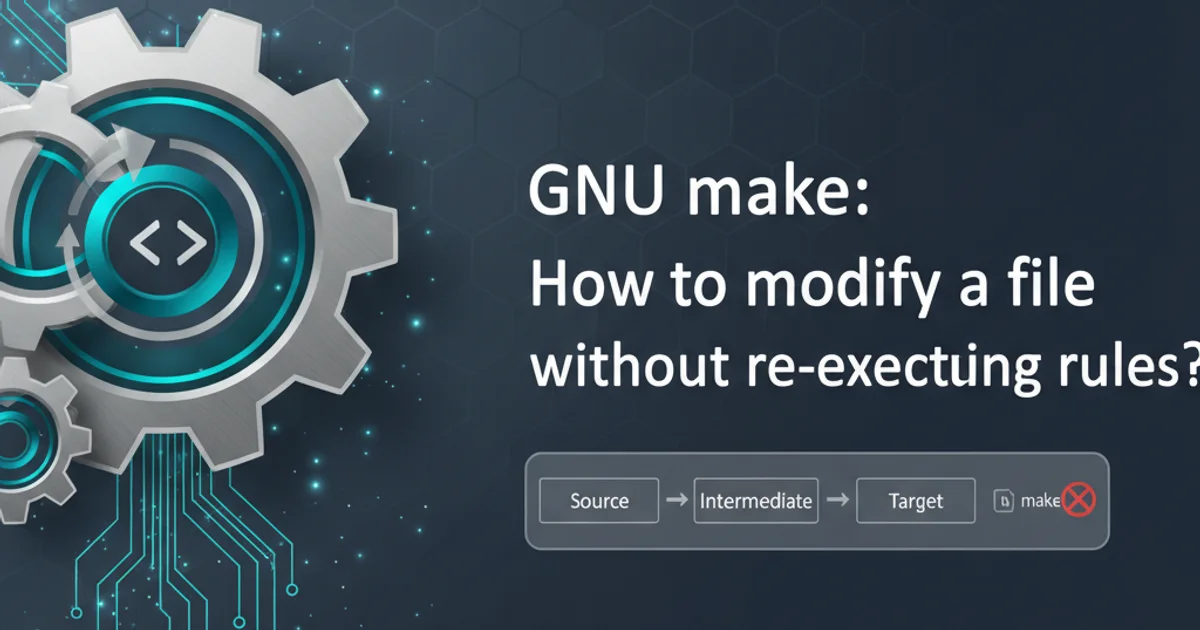GNU make: How to modify a file without re-executing rules?
Categories:
GNU make: Preventing Unnecessary Rule Re-execution for Modified Files

Learn how to effectively manage file modifications in GNU make to avoid redundant rule execution, optimizing your build process and saving time.
GNU make is a powerful tool for automating build processes, but sometimes a file might be modified in a way that doesn't necessitate re-running its associated build rules. This can happen, for example, if you're updating a timestamp or adding comments without changing the functional content. Re-executing rules unnecessarily can lead to wasted time and resources, especially in large projects. This article explores strategies to prevent make from re-executing rules when a file's content changes but its logical output remains the same, or when you simply want to update a timestamp without triggering a rebuild.
Understanding Make's Dependency Mechanism
At its core, make operates by comparing timestamps. When a target file's timestamp is older than any of its prerequisites, make considers the target out-of-date and executes the rule to rebuild it. This mechanism is efficient for most scenarios, but it doesn't differentiate between a significant content change and a trivial one (like updating a comment or a timestamp). If you touch a file, its timestamp updates, and make will assume it needs to be rebuilt, even if the actual content that affects the build output hasn't changed.
flowchart TD
A[Source File Modified?] --> B{Timestamp Check}
B -->|Target Older| C[Rebuild Target]
B -->|Target Newer| D[Do Nothing]
C --> E[Update Target Timestamp]
D --> EStandard GNU make dependency resolution flow based on timestamps.
Strategies to Avoid Unnecessary Rebuilds
There are several approaches to tackle this problem, ranging from simple workarounds to more sophisticated techniques involving checksums or sentinel files. The best method depends on the specific context and the level of control you need over the build process.
Method 1: Using make -o (Old) or make -t (Touch)
The simplest way to tell make that a prerequisite is 'old' (even if its timestamp is newer) is to use the -o (or --old-file) option. This option treats specified prerequisites as if they are older than their targets, effectively preventing rules from being run. Conversely, make -t (or --touch) updates the modification time of targets without executing their recipes, which can be useful if you've manually updated a file and want make to consider it up-to-date without rebuilding.
# Prevent 'main.o' from being rebuilt even if 'main.cpp' is newer
make -o main.cpp main.o
# Mark 'output.txt' as up-to-date without running its rule
make -t output.txt
Using make -o and make -t to control rebuilds.
Method 2: Checksum-Based Dependencies
For more robust control, especially when content changes are trivial (e.g., comments, whitespace), you can introduce a checksum or hash of the file's relevant content as a dependency. If the checksum hasn't changed, the file is considered logically unchanged, even if its timestamp is newer. This requires an intermediate step to generate and compare checksums.
%.checksum: %.c
sha256sum $< | awk '{print $$1}' > $@
%.o: %.c %.checksum
@if ! cmp -s $(patsubst %.o,%.checksum,$@) $(patsubst %.o,%.c.checksum,$@); then \
$(CC) $(CFLAGS) -c $< -o $@; \
cp $(patsubst %.o,%.c.checksum,$@) $(patsubst %.o,%.checksum,$@); \
else \
@echo "$< content unchanged, skipping rebuild of $@"; \
fi
# Example usage
all: main.o
main.o: main.c main.c.checksum
clean:
rm -f *.o *.checksum
Makefile using checksums to prevent rebuilds for logically unchanged files.
Method 3: Sentinel Files for Conditional Execution
Another technique involves using 'sentinel' files. A sentinel file is an empty file whose existence or timestamp indicates that a certain set of actions has been performed. You can make a rule depend on a sentinel file, and only update the sentinel file's timestamp (or recreate it) when the actual conditions for a rebuild are met, rather than just a source file's timestamp.
OUTPUT_FILE = my_output.txt
SENTINEL_FILE = .$(OUTPUT_FILE).done
$(OUTPUT_FILE): source.data
# Check if source.data has *meaningfully* changed
# For example, compare content or a specific part of it
@if [ "$$(cat source.data)" != "$$(cat $(OUTPUT_FILE) 2>/dev/null)" ]; then \
echo "Processing source.data into $(OUTPUT_FILE)"; \
cat source.data > $(OUTPUT_FILE); \
touch $(SENTINEL_FILE); \
else \
@echo "source.data content unchanged, skipping $(OUTPUT_FILE) update."; \
fi
.PHONY: all
all: $(OUTPUT_FILE)
.PHONY: clean
clean:
rm -f $(OUTPUT_FILE) $(SENTINEL_FILE)
Using a sentinel file to control rule execution based on content.